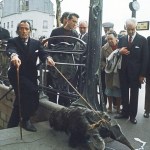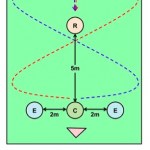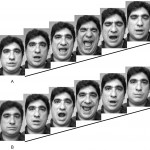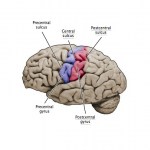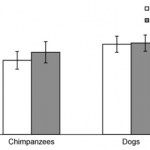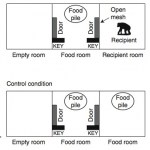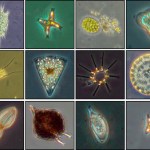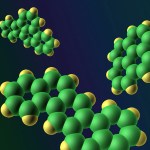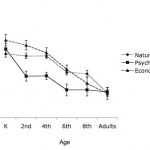Psychological Science
Late last week you might have seen headlines that went something like this:
"Pampered pigs 'feel optimistic'"
or, this: "Can you ask a pig if his glass is half full?"
or, "Pigs have feelings, too (and they prefer a bit of luxury)"
The headlines came, respectively, from BBC News, EurekAlert, and the Daily Mail.
This sounded pretty fishy to me. Optimism or pessimism requires a certain amount of introspection and future awareness. Without a meaningful sense of the future, optimism doesn't mean very much. I don't know much about cognition in pigs (and, for that matter, there hasn't been a ton of…
"But wait," you say. "Anteaters aren't pets!" Well, I didn't think so either. But Salvador Dali had a pet anteater. And that's good enough for me.
Figure 1: Salvador Dali taking his pet anteater for a stroll. (Source)
The Giant Anteater, Myrmecophaga tridactyla, only eats ants and termites, making it a myrmecophage. (Hey, Alex Wild, now I get what Myrmecos means!) In 1984, a researcher named Kent Redford was interested in the foraging behaviors of the giant anteater, and the relationship between these anteaters and their prey, colonies of highly social insects. So Redford went to Brazil to…
Have you heard about NCBI ROFL? It's a previously-independent blog that has been incorporated into "Discoblog," one of the blogs at Discover Magazine. What they do is find amusing or funny abstracts by searching Pubmed (which is run by the NCBI - National Center for Biomedical Information) and just post the abstracts. No commentary, no interpretation, just the text of the abstract. A lot of times I actually find the abstracts that they choose to post amusing. It is amusing that someone has decided to use superglue to remove objects that are stuck in peoples' ears, or that wooden kitchen…
In general, the ability to attribute attention to others seems important: it allows an animal to notice the presence of other individuals (whether conspecifics, prey, or predators) as well as important locations or events by following the body orientation or eyegaze of others. We've spent a lot of time here at The Thoughtful Animal thinking about how domestication has allowed dogs to occupy a unique niche in the social lives of humans. They readily understand human communication cues such as eye-gaze and finger-pointing, and capitalize on the infant-caregiver attachment system to have their…
From the archives...
Figure 1: Does Mickey feel empathy?
It probably depends on how you define empathy. Empathy, by any definition, implies emotional sensitivity to the affective state of another. Sometimes the empathy response is automatic or reflexive, like when babies start to cry upon hearing another baby crying. Sometimes a strong cognitive component is required, such as for compassion. A more specific understanding of empathy requires similarity between the affective states of the observer and the observed, with an understanding that the observer feels a certain way because he has…
It's been a pretty long stressful week around here, and not just because of Pepsipocalypse and the resulting fallout. But, well, I'm back, and I have an awesome paper to tell you about. When I saw it I just KNEW it had to be blogged.
Mythbuster Adam Savage sets the yawning in motion in Mythbusters attempts to start a yawning epidemic across the globe
Did watching that video make you yawn? Chances are it did, and you can thank contagious yawning for it. What is contagious yawning? Contagious yawning is a very well-dcoumented phonemenon wherein yawning is triggered by the perception of others…
There are some great questions coming in to Ask a Scienceblogger! If you (or your kids?) have a question you want answered by a scienceblogger drop by Page 3.14 (the blog of the SB overlordz) and leave your question in the comments on this post.
Tyler asked:
It's said that the left hemisphere of the brain controls the right half of the body and vice versa. Does this apply to the processing of audio and visual stimulus of the ears and eyes as well? Does the left half of the brain process what the right eye sees and vice versa?
There's actual a few questions in here, so let's break this apart…
Happy Father's Day, everyone!
I spent a lot of time today thinking back to why I started blogging in the first place, while I was at my parents house doing the other-than-science things that I love to do: playing with the dog, cooking, gardening. I realized that I've not done enough of that stuff lately.
I've only been seriously doing the blog thing (in the current format) since January, and I've now been here at Scienceblogs around two months, so it was time to reflect. The transition from Wordpress obscurity to Scienceblogs prominence happened relatively quickly for me, and I think it's a…
Dogs are particularly good at tasks that involve communicating or cooperating with humans, which has led some researchers to speculate that they are really good at solving social tasks, more generally. For example, dogs can figure out where a human's attention is, are really good at picking up on eye-gaze and finger pointing cues, distinguish among different individual humans (by contrast, humans are really bad at distinguishing among different individual monkeys, for example), and at least in one outstanding case, are capable of "fast mapping."
Relative to non-human primates, domestic dogs…
If you're a regular reader of Peter and Travis's blog, Obesity Panacea, you may have heard one of their semi-regular blogcasts. Well, since Peter is traveling the world (read about it here), Travis asked me to join him for a blogcast. While discussing topics that we could discuss, a sent a few links and papers his way, and he was like "ugh, self-report." And I was like, "dude, self-report makes the world go around."
Okay, so the conversation may not have gone exactly like that, but the outcome was we decided to go ahead and talk about the relative merits of self-report data in science.
As he…
Evolutionary Psychology suffers from a PR problem, which can be mostly blamed on ignorant (even if well-intentioned) members of the population who don't know what they're talking about.
Evolutionary psychology attempts to describe the evolution of the mind and of behavior and, well, everyone has a mind, and everyone can observe behavior. This makes people think that they are experts. Anybody who has ever had a child knows everything there is to know about child development. Anybody who has ever owned a dog becomes an expert on canine behavior. Study after study demonstrates the fact that…
Bonobo Week continues! I'm donating whatever proceeds I receive from my blogging shenanigans for the entire month of June to help the bonobos at Lola Ya Bonobo.
Imagine that you're wandering in the desert and you come across two magic lamps. One lamp grants three wishes. It's your standard sort of magic lamp with a genie in it. (No wishing for extra wishes, of course.) The second magic lamp is, well, a moody magic lamp. It's inconsistent. Sometimes it grants one wish, and sometimes it grants seven wishes. But the thing is, you don't know for sure whether, when you rub the lamp and genie pops…
Bonobo Week continues! I'm donating whatever proceeds I receive from my blogging shenanigans for the entire month of June to help the bonobos at Lola Ya Bonobo.
Primate researchers used to think that only humans voluntarily share their own food with others. At the time, it was a reasonable conclusion to make, since lots of studies indicated that chimps don't. But that was before anyone checked to see if bonobos were willing to share their food with others.
So Brian Hare and Suzy Kwetuenda tested pairs of the bonobos from the Lola Ya Bonobo sanctuary in DRC. In all cases, the two…
Yesterday afternoon, I watched the livestream of the "All Creatures Great and Smart" session of the World Science Festival in New York City. The session was absolutely fantastic, and featured Brian Hare, Vanessa Woods, Jeremy Niven, Patrick Hof and Klaus Zuberbühler.
The conversation challenged long-held assumptions about the differences between "animal" and "human", and included fascinating discussion about pin-sized brains that can count, categorize, and hold a grudge against those who've tried to swat them. Does your dog really think and feel like a human? Do our closest primate…
Some kids more readily recognize Ronald McDonald than the President of the United States of America. Sad, right?
Check out this exchange, from the 2004 movie Super Size Me:
Morgan Spurlock: [to kids] I'm gonna show you some pictures and I want you to tell me who they are.
Children: OK.
Morgan Spurlock: [Showing a picture of George Washington] Who's that?
Child: George Washington?
Morgan Spurlock: Good. Who was he?
Children: He was the 4th president. He freed the slaves. He could never tell a lie.
Morgan Spurlock: [Shows picture that you can't see] Who's that?
Child: George W. Bush?
Morgan…
Let me tell you a little story. When I was born my parents had two cats. One was named Garfield. The other...well, I don't remember what the other one was called. Not long after I was born, and little Jason was coughing up furballs, the doctors informed the parents that their little bundle of skin and hair was allergic to cats. It was then that teams were picked and lines were drawn. It was me or the cats. Luckily, the parents decided to keep me, and lose the cats. Imagine how much it would have sucked if they decided to keep the cats and lose me. I imagine if my younger brother had actually…
Today for Monday Pets, we're going to go old school and talk about vision.
Vision is arguably our most (intentionally) utilized sensory system, so its pretty important to figure out how it works. And it's what David Hubel and Torsten Wiesel set out to investigate starting in the late 1950s. Ultimately, their work would get them a Nobel Prize in Physiology or Medicine, in 1981.
Basically, they took a bunch of cats, anesthetized them, and showed them patterns of light on a screen. Meanwhile, some microelectrodes were placed in various precisely determined spots in the cat's visual cortex, and…
Happy Earth Day, everyone!
In honor of the day, here's a modified re-post of piece I wrote recently for LAist.
Figure 1: Photo by poloroid-girl via LAist Featured Photos on Flickr.
The great philosopher Kermit the Frog once said, "It's not that easy being green." Maybe he was on to something.
You can't walk three steps down an aisle in any store without running into eco-friendly or "green" products. You probably have many of these products. Is your refrigerator or dishwasher Energy-star compliant? Do you have a paperless Kindle? Maybe bamboo guest towels in the bathroom? A Prius?
Why do you…
This seems to have become unofficial volcano week, here at ScienceBlogs. If you haven't been following the coverage of the Eyjafjallajökull eruption at Erik Klemetti's Eruptions blog, you should consider doing so. Also, Dr. Isis has a post on how the eruption has fouled up all nuclear imaging plans at her place of research, and Ethan explains how volcanic lightening works.
Our benevolent overlords have further commented: "Eyjafjallajökull's ill temper has been an unexpected object lesson in the complexity and interconnectedness of our environment, technology, and social networks." To that I…
What is science? Fundamentally, science is a process of hypothesis-testing. Scientists observe phenomena, propose hypotheses to explain or account for some observed phenomenon, and design experiments to test those hypotheses. Then those or other scientists attempt to replicate the findings. In other words, science is performed in the following manner:
1. Define the question
2. Gather information and resources (observe)
3. Form hypothesis
4. Perform experiment and collect data
5. Analyze data
6. Interpret data and draw conclusions that serve as a starting point for new…

